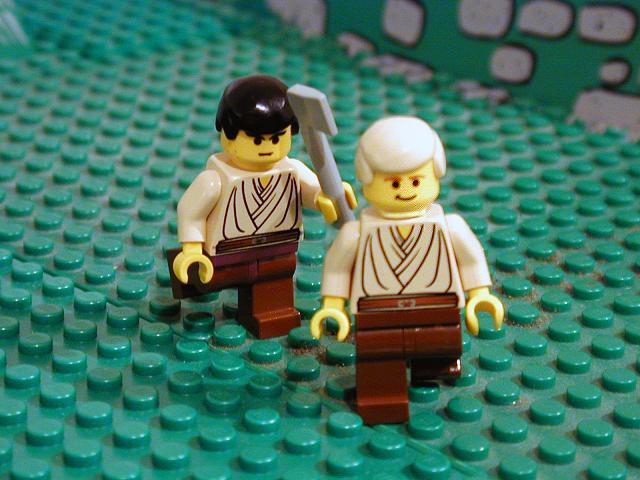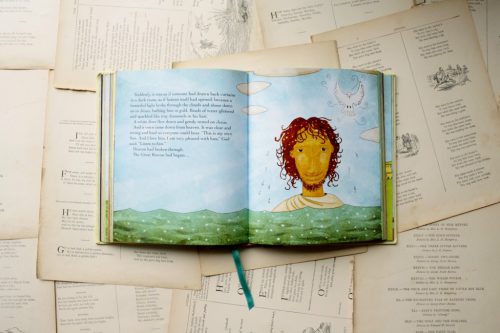

When I was a kid attending Sunday School in a very traditional Baptist church in the Midwest, we learned Bible stories… I became familiar with the regular cast of characters like Adam and Eve, Noah, David, Moses, etc. I could tell you that Moses parted the Red Sea; Adam and Eve ate an apple; David slew a giant (thanks to a relative who gifted me one Christmas with 12-inch David and Goliath action figures!). As a teen, I would learn that the book of Leviticus was all about how family members in the same house should not undress in the same room…and that when I would eventually marry, I should not “engage” my wife during certain times of the month…
In short, my Biblical education left me spiritually illiterate. I knew the Bible allegedly contained stories (plural), but it wasn’t until I actually came to faith in my early 20s that I would learn that the Bible only has One Story…rather, the Bible essentially is One Story. A single narrative consisting of various chapters and episodes thread together and woven around One Hero, One Champion, One Savior. I knew about individual vignettes in the Scriptures, but had no idea how one connected with the other.

All of that being said…there’s one so-called Bible story (with a little “s”) that always confused me perhaps more than any other. I could never understand what the big deal was concerning Cain and Abel. I mean, what was the issue with the elder brother offering vegetables unto God? Why was God so particular about the crop Cain cultivated, reaped, and presented to the Lord? Fast forward to my young adult years and the beginnings of my faith walk with Jesus, and I had a better appreciation for the concept of the blood sacrifice as an atonement for sin; the promise of a head-crushing Seed (Genesis 3:15) via the woman (Eve/Mary); and how this first worship service post-Fall illustrated the essential divide between the religion of works-righteousness versus the irreligion (or rather anti-religion) of Grace…
In recent years, through the publication of such excellent books as The Jesus Story Book Bible, The Gospel Story Bible; movements like The Gospel Project; sermons like Tim Keller’s ‘True and Better’; and many more in this ilk, a renewal in gospel-centered, Christ-centered Biblical interpretation has resurged in the church. So, if we consider the story of Cain and Abel in this light, the parallels between Jesus and Abel are not difficult to see. Hebrews 11:4 and 12:24 help us process the Jesus-connection as they confirm Christ as the fulfillment of Abel’s shadowy lamb offering as well as “Christ as the better intercession” than Abel’s metaphorical blood crying out to God from the ground.

But I posit that there is a loose sense (if I may be allowed some liberty here) in which Jesus is not only ‘the better Abel’… He is also the ‘better Cain’.
Let me set this up firstly by highlighting the typical manner in which we tend to teach this account. So, when I was a kid (and even hearing Genesis 4 taught as an adult), the application usually amounted to some form of warning against sinful anger and its consequences and/or a charge to do a better job loving your brother. Oh yes, I almost forgot! This mini-narrative is also about the importance of always giving God your best. Therefore, when we hear God’s words to Cain that “‘sin is crouching at the door…and you must master it’”, we automatically assume that a technically advanced sanctification routine combined with a resolve to say “no!” to sin is in order.
When God mentions ‘doing well’ and ‘mastering sin’, He is of course referring to faith in the Promised Seed as expressed through the offering of a slain innocent animal. So, God is basically saying to Cain, “if you put faith in Jesus (who is to come), you will be accepted…if you try to work this thing out in your strength, in your righteousness, you will fail.” Okay…this is true, and I think Romans 2:6-13, 6:11-14 help to bear this out as well. However, if we leave the conversation here…we still in a sense have a conditional duty as the source of righteousness, redemption, and sanctification. In other words, if we leave our understanding here in “if” language, we still have something we have to do to get it right…something we have to do to facilitate and sustain the mechanism of sanctification in our daily lives.

There’s a better word…there’s better news than ‘Abel is a foreshadowing of Christ.’ Jesus is the antithesis to Cain and his self-righteousness; to you and your self-righteousness; to sin itself. The dichotomy we are dealing with is not ‘doing good things’ vs. ‘sinning’. The tension fundamentally exists between Sin and Grace. And Jesus is Grace personified.
We are apt to say, “Cain should have said ‘no’ to sin…and so should you…and so can you, with God’s help.” I agree, sort of… With God’s help I can say ‘no’ to sin…sometimes. But there are so many times that even with the power of the indwelling Spirit available to me, I just want to sin… I just want to justify myself. How many times have I resisted when the Holy Spirit has ‘unctioned’ and empowered me to let go of a grudge and affectionately draw near to my wife after an argument? In many of those moments, I’m more interested in being right than being gracious… I’m more interested in standing my ground than resting in My Savior. I don’t know why I’m like this…anymore than I know why you’re like this! I can’t explain.
The moral to the story is that there is no moral to the story. But there is a Hero of the story…his name is Jesus. And He is our “say ‘no’ to sin”. Christ is “say ‘no’ to sin” and “said ‘no’ to sin” incarnate and indwelling…and credited to your account even when you’re in the midst of your worst sin.
You are absolved!

COMMENTS
Leave a Reply












